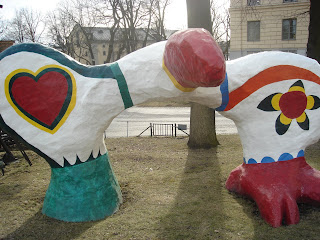Three workshops today, with delegates rotated across them over the course of the day. I'm in a group with the other non-Swedish speakers and our translator Therese, among others, and our first workshop is with Kunq and Qaos, two Stockholm-based queer theatre companies.
Kunq's ethos is one of 'embracing your outsiderness'. They provide a space for Lesbian, Gay, Bisexual and Transgender youth where it's okay to be different. They spoke about how you gain something when you work separately, as you're not always defining yourself in relation to something else (i.e hetero dominance). Qaos was set up by a former member of Kunq for slightly older teenagers.
Next, Stut, a community based theatre company from a working class area of Utrecht, Holland. A 'stut' is a device that supports coal mine shafts and stops the roof from caving in on people below. The idea behind Stut the theatre company is to ease the pressure on the lives of working class Utrechtians by providing a release through participation in theatre. Stut have been going for an impressive 28 years, and have developed an effective and successful methodology. They hold a series of indepth workshops and discussions with local residents, on the theme of the proposed play, and listen to the 'experiences rather than the opinions' of the participants. Stut have learnt that it's more effective to begin with a personal conversation, before gradually moving onto specific themes and issues that the play may centre on. They then ask members of the group whether they'd be interested in performing in a play, and these people are asked to attend workshops, where scenes are improvised, showing the dilemmas and experiences they face in their lives. These provide open and honest insights. Joss Bours, the resident playwright at Stut, makes a note of behaviour patterns, mannerisms, ways of talking, and attitudes, to enable him to write parts that will use the natural presence of each of the non-actors, rather than expecting them to inhabit a different character.
Stut's primary audience is made up of the local community with whom they work, but they also play in more traditional theatre institutions. Jan Rijnierse, the General Manager of Stut, spoke of the markedly difference audience reactions - the difference between a direct and immediate response from the local community, and a more indirect, polite one from the more traditional theatre-going crowd.
Finally, House of Dreams, who held the most active, participatory workshop. Lotta Lundgren and Liza Fry led the session with the warmth and enthusiasm of particularly likeable childrens' TV presenters. We were asked to form groups and become a whisk, a vacuum cleaner, a boat, and finally the physical representation of togetherness. This was a theatre conference after all - I'd just had a lucky escape so far. House of Dreams work primarily with young people in the disadvantaged area of Rosengard, in the Southern Swedish city of Malmo (near Lund). They showed us some slides of their large, ambitious productions, and talked a bit of how they'd slowly won the trust of the teenagers they worked with.
Later, we heard from Erik Ehn, a dramatist and decan visiting from Cal Art, L.A, who started the Center for the Study of Genocide and Culture over there. He talked about the changing principles of his school:
- a desire to find students who would be 'thoughtful anarchists', who understood that art doesn't exist in a vacuum, and that work is more valuable the less personal and the more common it is.
- a move towards a nuanced and complex view of the world that must be viewed from all angles (rather than THE great novel or THE great play).
- that work is most experimental when it uses metaphor - when more than one thing is happening at once. A function of art today is to keep things strange. We can offer stillness and silence in response to the rapidity and pace of the world.
- and finally, that we have 'spiritualise the internet'. i.e find a way to internalise the networks of the web and find a stillness within those relationships.
He saw the artist's role as running alongside that of the social worker or health worker (except we have unintentional goals), and saw the relationship between art and education as providing a safe space for impossible language - e.g. with personal experiences of genocide.
We also heard from Jonatan Stanczak from the Freedom Theatre in Jenin, and Ylva Gislen, the Head of Education at the prestigious Dramatic Institute, Stockholm.
In the evening, we congregated at a grand hall, hired from one of the local universities for the evening. Apparently the place was more used to black tie balls and old boys network gatherings than theatre types watching avant garde dance. A lavish spread had been put on for us, and it was a chance to wind down and do more 'networking' (or engaging in mindless banter). A DJ started playing after the avant garde dance (brought to us by the Botkyrka community theatre, and choreographed by Paloma Madrid) had wound down. However, the fact that the dancefloor was fully lit, while the surrounding areas were cloaked in darkness meant that I didn't venture out to join the more gregarious types busting some moves. I mean, people might have been looking...










